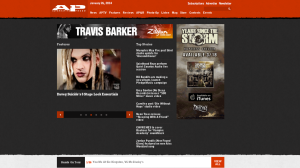If I get to choose, then this is what I choose. When I write it’s most often from my heart and very personal. This is an attempt at poetic storytelling. To tell the story of a lifelong battle…
Talking To Strangers
This weekend my friend Kelly and I went to the Jacksonville Celtic Festival in St. Augustine. As we were sitting on a bench enjoying some traditional, although still “fair-like”, Celtic grub I noticed an unattended 3 year old girl a few feet from us. She had on a Princess dress, Belle to be exact. Blond haired, blue eyed and friendly. She talked to my friend and I like it was nothing, as if she was never warned not to talk to strangers.
In the article, “Online Credibility and Digital Ethos:…”, children’s ability to judge websites for the credibility is said to be of particular interest of researchers.
“More generally, some youths may not be as critical of digital media or particular online information sources as adults because these media are not “new” to young people who cannot remember a time without them, and thus they do not apply the same level of skepticism toward digital media as do adults.”, this statement brought to mind the little girl from the Celtic Festival.
Her parents probably have mentioned not to take to strangers, but she did. The Internet is a stranger, yet we welcome it into our homes with open arms. Yes, the younger generations will know nothing else except to use the Internet as it will be the primary source of information. As with the little girl, we see most children can be trusting to a fault.
Unfortunately the internet is not a for kids, by kids business. Although we do see that children can post information for anyone to see.
For years now I have been told that Wikipedia should not be used as a source for research papers, because anyone who can type can make an entry into the online “encyclopedia”.
Then there are blogs and anyone can also write a blog.
Whose words can we trust?
And how do we know we can.
As we age we take our experiences, form opinions and begin to establish “places” we feel we can go to for information.
Honestly, I think the key to determining credibility is to balance the places you get your information from.
If you read one science blog, why not check out another that is on the same topic cross reference the information. Also, looking into the author is not a bad idea either. Find out their background, are they qualified to speak on the issue or should it just been taken as opinion?
I think know and in the future we will have to do more work when conducting research. You almost have to research your research, before you can even start your research. Meaning, where before when I did research I could check out a couple of books from the reference section and not think twice about it being credible. Now I feel like I can search many more sites for the same information and still not feel entirely certain about what I’m reading.
Credibility can be found on the Internet, but it is definitely the responsibility of the audience to verify the information before internalizing it as truth.
We teach our children to be aware of their surroundings. Now there are new surroundings to be aware of, the Internet. The best way to protect them is to teach them.
Brave Face
For this blog post:
Turning class lessons
Into therapy sessions
I can’t help it because
I played the biggest part
In the breaking of my own heart
Are You Down With FST & DRT?
- through the history of the meaning of a word
- mathematical logic is used to decipher meaning and validate the truth of the statement
- Native to Foreign
- Natural to Computer
- Predictive Text
Is Anything Sacred in Media?
Social media is more than a presence or source of communication. It is shifting from the casual checking of statuses and short witty posts to an almost keeping up with the social media Jones’s type of living. In our day and age nothing is sacred from becoming a post onto someones social media site. This seems it could be posing a problem where the law is concerned. In a time when freedom of speech has never been easier to pursue, could it unintentionally become the downfall of the jury selection process? Many people feel there is no longer a need to hold their online tongues. They can and will say anything about trending topics and issues they feel passionately about. Which is great for FaceBook and others because the site is getting used and generating traffic. For lawyers, however I can see how this can make their job both easy and difficult at the same time. Once you make a post about your opinion or fill your profile with all your political views those selecting for the jury can see right away whether you’d be a good fit. With the ease of putting out your opinion, how far will they have to search to find unbiased jurors and will the pool just inevitably get smaller over time? In his article, Beware Risks Of Using LinkedIn During Jury Selection, William O’Neill explains how LinkedIn has all the information a lawyer needs about a prospective juror, but could put the lawyer in an unethical situation. LinkedIn can send you a notification to inform you that your profile has been viewed and by who. Although, the lawyer may not actually be sending the notification it can be seen as communication between a lawyer and a juror and the lawyer can end up in some trouble. Lawyers are not allowed to communicate with jurors by any means when not in court. The availability of enabling notifications on who has checked out your profile also creates another problem for jury selection, keeping it ethical. The progression we’ve seen so far with the technology of social media sites leads me to believe that solving this problem will not get easier anytime soon.
Marching to the Beat of Their Own Drummers?!
As it opens, I am lulled by the warm violin like sounds, the pop and sizzle of the snare drums. Her face comes into focus. I fell in love and I am still reeling.
The video is an in-studio performance by a Minneapolis band named Poliça(Poe-Lisa) at a local radio station 89.3, The Current. The song is, “Wandering Star”. So sweetly simple, there were no distractions from the beauty I was about to witness. Her name is Channy Leaneagh, her voice is more than a given talent. It is aided by Auto-Tune to craft a soft, airy, yet haunting sound. Which we get to watch her create throughout the video.
They also have bass player and backup vocalists, Chris Bierden. He does slappa da mean bass, mon! (Sorry, gotta love Paul Rudd!)
The real moment for me is when the camera shifts focus to highlight the count them one, two drummers in the band. I knew about the Auto-Tune, but two drummers! I was Jack Skellington in Christmas Town singing, “What is this?”. I lost my breath, I never knew such marvelous things existed.
The instances of Ben Ivascu and Drew Christopherson are a marvel, watching the two drummers playing with and off of one another. Four arms moving in sync and then also in their own patterns reminded me of octopus tentacles. In the Minneapolis music scene this is very common for bands. I cannot recall anything in recent music that I have seen or heard that has excited me more than this. I felt like they say, a kid in a candy store. So much giddy excitement that I had to indulge myself, I watched all the videos I could find.
Now, this video is from a few years ago, but having just recently fallen into the world of Poliça it is still new to me. Experiencing this video only served to solidify my place as a fan and I am waiting, patiently for them to come anywhere near Florida so that I may be an eye witness to this genius.
If you are interested, here is a newer performance at 89.3. Chain My Name
It’s So… Dialogical!
If you’ve ever delivered a speech or presentation then you know your main objective is to persuade your audience. Like so many others I had to take a speech class and for my final speech, I delivered a knockout. It was about water and its condition from an ecological standpoint. I gave them the facts, examples of the facts and then summed it up nice and neat. Then I took my seat and that was where it ended. There was no dialogue, I didn’t offer a question and answer period or ask for any comments or opinions. If I posted that same speech on our class blog I would be instantly turning it into a living, breathing dialogue. The blog has become the medium in which my message is conveyed and if you don’t like my message, you can feel free to respond in any medium that you see fit. I read the comments that people leave at the end of posts, I love to see genuine opposing positions or decrees of admiration and then I skim most of what falls in between. Reading and responding to this post is what James Zappen was speaking to when he ended his statement on Bakhtin’s “dialogical rhetoric” with, “Bakhtin’s dialogical rhetoric is not restricted to oral discourse, but it is possible in any medium, including written, graphic and digital.”
So, let’s get dialogical. What am I into? Music. I revisited a website I used to frequent, altpress.com for my conversation partner and I was ready to talk. I particularly enjoy CD reviews, who’s up and coming, and what are the bands I listen to are up to. Let’s see how this site fairs as a conversationalist.
“Planning means asking: Why? Who? What conversations?” We see on this site these questions are answered by the contents covered. Music is a very broad category, that encompasses so many genres it would be hard to have a site dedicated to all of them. Right in the title of the site we see that it caters to what is deemed as the alternative side of music. If you’re into Pop music this ain’t your magazine. So we can see the “Who?” is someone who listens to alternative rock, of which there are plenty. The “Why?”, because music is a big business and musicians are some of the biggest celebrities there are. People want to know if the music they are about to spend their hard earned money is worth it or not, what bands are on the rise, anyone good on tour?, and musicians are usually making big headlines. Then there is “The Conversation”, how does AP keep it going, the site itself is arranged pretty neatly allowing me to, “…just grab what they need and go on to look up to look up their next question…”.
Any good CDs come out lately?(Scroll, scroll)
Oh, AgainstMe! I just downloaded that album, Transgender Dysphoria Blues, I wonder what they think here at AP. (Click)
The CD itself got 3.5 stars and of course there was a comment section for the die hards and naysayers to put their two cents, but what I was pleased about was that I found the answer to a prior question. Why the title? Well turns out Tom Gable, lead singer for AM!, is Transgender and the album is the story. Here is where I lost a chunk of my life, I found a related article underneath the review. The article was basically just saying he was coming out as Transgender, but help us all there was a link to another article. From that article to another, link to link like a squirrel running limb to limb on a tree. I was a lost squirrel for a minute, then I remembered I’m a girl and I’m supposed to be doing something important.
I made my way back to the homepage and decided to glance over The Feed(looks like this):
From the feed I looked around and then I found, “39 up-and-coming bands you must check out before 2013 ends.” It might be slightly after the fact, but it was good enough. If I wanted to know what was anticipated in 2014 I’d have to purchase a copy of the magazine. I will be returning to this website soon. I know that I can find what I seek when it comes to the bands I enjoy.
To start your conversation, use the feed as your ice breaker if you find yourself at a loss for words. You can look at everything all together or choose a category to filter the content you are shown. Just click on the headline under the picture and the conversation never stops . Read a review and then leave your review keeping the dialogue open.
Ding
“This is your captain speaking, you can now feel free to communicate unrestrictedly. Thank You.”
Intro
I have been with FSCJ since before it was FSCJ. We go way back. It is sort of unfortunate how far back we go. I could have probably two Master’s degrees by now. I was going to be a scientist and everything was going great until… I decided to enroll in an 8 week General Chemistry 1 course. I said to myself, “No problem”. After all I have taken chemistry before in college and high school. After barely making it out alive with a C average, I thought why not do that again with General Chemistry 2. I think I sat in that class for two weeks before I decided I just did not care anymore and that if I had to do anymore math I would probably ,well, you know. Anyway, here I am in the Converge Communications program and I would like to pursue the TV Production route. I really love to write and I love to get paid. I’m hoping this degree will help me marry my two loves.





